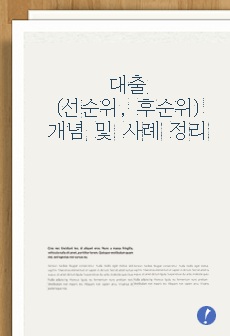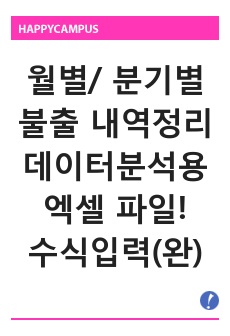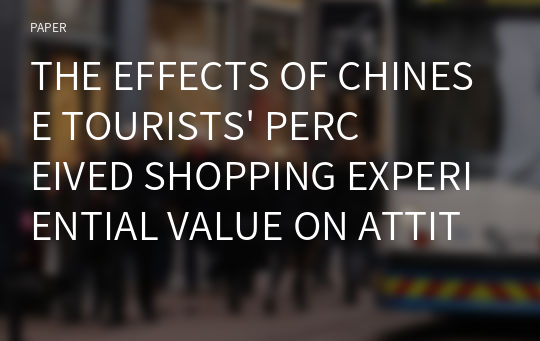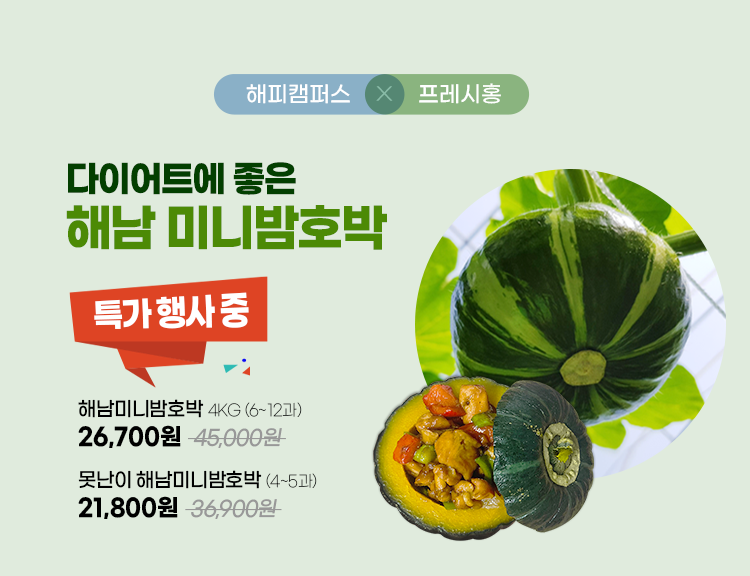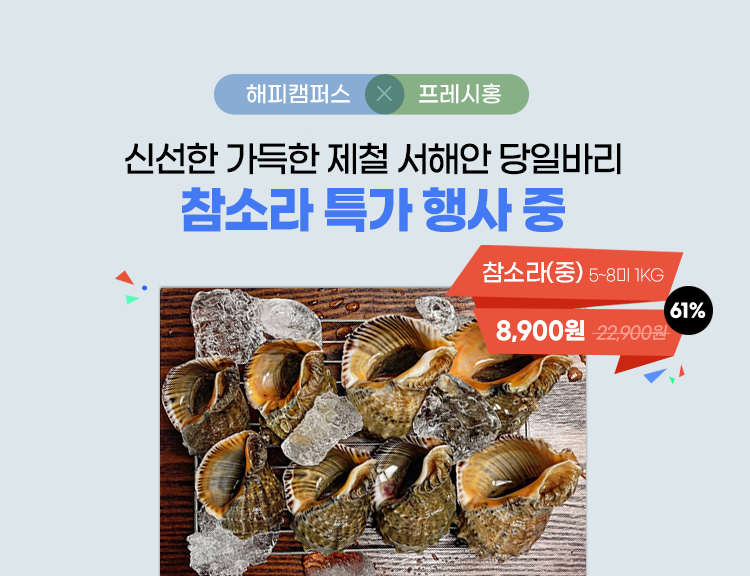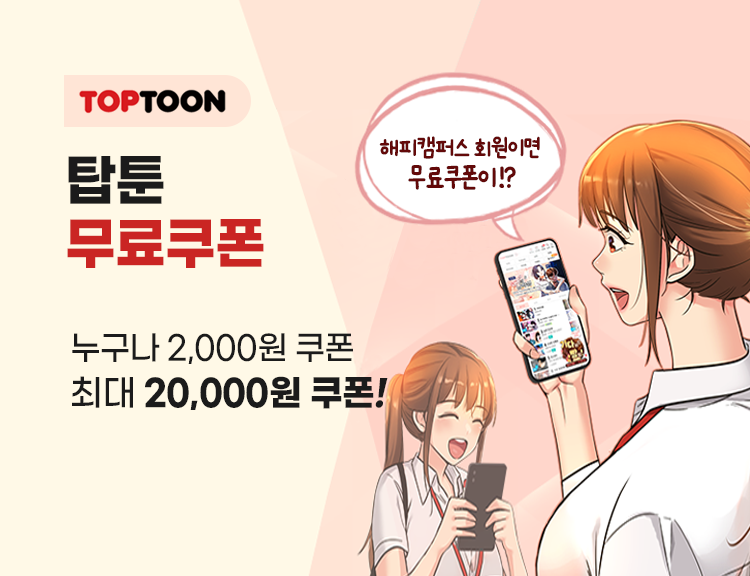THE EFFECTS OF CHINESE TOURISTS' PERCEIVED SHOPPING EXPERIENTIAL VALUE ON ATTITUDES TOWARD PRODUCTS AND STORES
* 본 문서는 배포용으로 복사 및 편집이 불가합니다.
서지정보
ㆍ발행기관 : 글로벌지식마케팅경영학회(GFMC)
ㆍ수록지정보 : GFMC Session1
ㆍ저자명 : Jimin Kim, Eung Tae Kim, Ha Kyung Lee, Eunsoo Baek, Ho Jung Choo
ㆍ저자명 : Jimin Kim, Eung Tae Kim, Ha Kyung Lee, Eunsoo Baek, Ho Jung Choo
영어 초록
Backed by the rapidly-growing economy, China sends the most tourists to Korea. Accordingly, growing consumption of Chinese tourists is strongly drawing attention of the Korean retail industry. Academia has conducted more relevant researches, such as effective branding of Korean Wave, and services to attract tourists. Despite a series of efforts, including specialized tour products and language services, there have been an increasing number of Chinese visitors complaining about their experience in Korea and Chinese tourists are urgently demanding improvements. Hence, comprehending sophisticated consumption behavior of Chinese tourists is becoming more important than ever before. Also, it needs to explore how shopping experiential value that they experience while purchasing fashion goods in Korea affects their satisfaction of the store and product.Previous literature has shown that perceived shopping value has a positive effect on customer satisfaction and behavioral intention (Mathwick et al., 2001). Previous domestic studies that targeted Chinese tourists have focused on investigating the shopping motivation and satisfaction (Ko, 2011) and market segmentation of Chinese tourist shoppers (Oh, 2014). Previous studies have approached this problem mainly from its cognitive aspect and few studies have focused on the emotional aspect during shopping. This study suggests that emotional behavior mediates the relationship between shopping experiential value and consumer attitude toward products and stores.
According to the Korea Tourism Organization, the ratio of male to female Chinese tourists visiting Korea changed from 69:31 in 1995 to 59:41 in 2005. In 2013, female Chinese tourists outnumbered males at a ratio of 41:59. The number of Chinese female tourists continues to increase. Females are known to be more involved in fashion consumption. Hence, this study is conducted on 550 Chinese female tourists who have shopping experiences during their visit to Korea. The ages of the respondents range from 20 to over 50 years old, with a mean age of 33.5 years. Their shopping experiential value is measured by visual appeal, crowding, economic benefits, and service excellence, and is expected to trigger emotions of entertainment and escapism. Variables including entertainment and escapism are measured using the Experiential Value Scale developed by Mathwick et al. (2001).
This study finds that three experiential values (visual appeal, crowding, and service excellence) have positive influences on entertainment. For example, customers feel greater entertainment when visual appeal, service excellence and/or the number of customers in the store is greater. The emotion of entertainment turns out to have positive impacts on both store satisfaction and product satisfaction. According to the examination of how shopping experiential values affect escapism, crowding and economic benefits have a positive impact, whereas visual appeal and service excellence have a negative impact on escapism. Previous studies define escapism as an emotion of which customers are absorbed by entertaining activities and satisfied with shopping. This study assumes that all the shopping experiential values may have a positive impact on escapism. Escapism is a status where customers are deeply occupied with shopping without thinking of anything as if they were in another world, and a much stronger emotion of entertainment than usual pleasure from shopping. This study finds that the higher visual appeal and service excellence tends to generate the lower the escapism. This may be attributable to the fact that the survey was examined only on Chinese tourists. The respondents were asked to recall the most memorable item among the fashion products that they purchased during their visit to Korea. Their shopping experiences varied widely from well-organized malls, like department stores and duty free shops, to crowded environments, like Dongdaemun, traditional markets and subway stores. As a result, different experiential values have different impacts on escapism. Economic benefits and crowding which are experienced during shopping help to absorb in shopping, and these are likely to have positive impacts on escapism. On the other hand, visual appeal and service excellence may have different influences on escapism according to the shopping environment that Chinese consumers experienced. For example, Dongdaemun or subway stores are less visually appealing than department stores or duty free shops, but trigger stronger sense of escapism. Because survey questions to measure service excellence include Chinese (language) proficiency of sales staff, it is expected that higher language proficiency level of sales staff tends to generate lower degree of escapism, the sense of feeling that one is indeed in foreign country like Korea, for customers. Escapism has negative impacts on both product and store attitudes. Escapism is a status of absorption in which customers are emotionally occupied with pleasant feelings, and purchases along with a high escapism are likely to be less rational and more impulsive. In particular, this study examines tourist shoppers, and the respondents evaluate products they purchased in another country after they return home, and this may have caused the negative attitude toward products and shops. In fact, some previous studies found that overly positive emotions have negative impacts on purchase behavior (Liljander &Standvik, 1997; Andrade, 2005).
This study confirms that the shopping experiential values perceived by Chinese tourists affect their product and store attitudes through the emotions of entertainment and escapism. It is particularly notable that this study verifies diverse roles of different emotions such as entertainment and escapism in the context of tourist shopping. This study employs empirical analysis on tourists, and provides practical implications including the importance of shopping experiential values for developing retail strategies.
참고 자료
없음"GFMC Session1"의 다른 논문
 FAST AND SLOW FASHION BRANDS IN DEVELOPING SUSTAINABLE ..6페이지
FAST AND SLOW FASHION BRANDS IN DEVELOPING SUSTAINABLE ..6페이지 “WHAT IF A CELEBRITY AND A BRAND CO-CREATE A NEW COLLEC..7페이지
“WHAT IF A CELEBRITY AND A BRAND CO-CREATE A NEW COLLEC..7페이지 THE INSTAGRAM’S STRATEGY IN ENGAGING THE CUSTOMER’S LOY..3페이지
THE INSTAGRAM’S STRATEGY IN ENGAGING THE CUSTOMER’S LOY..3페이지 THE PARTICULARITIES OF NEW PRODUCT DEVELOPMENT IN THE T..5페이지
THE PARTICULARITIES OF NEW PRODUCT DEVELOPMENT IN THE T..5페이지 THE LONE CHOCOLATE BAR: THE INFLUENCE OF PERCEIVED SCAR..6페이지
THE LONE CHOCOLATE BAR: THE INFLUENCE OF PERCEIVED SCAR..6페이지 ADS AS WORKS OF ART: MEASURING ADVERTISING IMMERSION3페이지
ADS AS WORKS OF ART: MEASURING ADVERTISING IMMERSION3페이지 ECONOMIES OF SMALL: NICHE STRATEGIES AND SUCCESS FACTOR..8페이지
ECONOMIES OF SMALL: NICHE STRATEGIES AND SUCCESS FACTOR..8페이지 THE INFLUENCE OF ONLINE CUSTOMER REVIEWS ON RETAILERS' ..6페이지
THE INFLUENCE OF ONLINE CUSTOMER REVIEWS ON RETAILERS' ..6페이지 IS THE ARTIFICATION PROCESS PERCEIVED BY FINAL CONSUMER..6페이지
IS THE ARTIFICATION PROCESS PERCEIVED BY FINAL CONSUMER..6페이지 THE ODD EVEN PRICE PARADOX IN THE FASHION LUXURY SECTOR6페이지
THE ODD EVEN PRICE PARADOX IN THE FASHION LUXURY SECTOR6페이지










